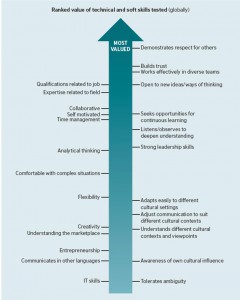August 28, 2015, by NUBS Postgraduate Careers
Developing a Global Mindset
As the employment market becomes increasingly globalised and complex, more and more employers are looking for graduates with an awareness of these issues and an ability to work across countries and cultures. This is referred to in a variety of ways – some call it a global mindset, some talk of global competencies and some are organisations are now looking for global-minded graduates.
It’s important to realise that a global graduate isn’t simply someone who can speak a foreign language or has travelled abroad. Whilst being multilingual can be a huge advantage the term global mindset covers a much wider spectrum of skills and qualities including the ability to understand international perspectives, to work with people from different cultures and backgrounds and can grasp how international business interconnects and operates.
One definition of global mindset from the FT Lexicon is
‘one that combines an openness to and awareness of diversity across cultures and markets with a propensity and ability to see common patterns across countries and markets’.
Different employers often include different skills and attributes within the term global mindset or when talking about global competencies. BG Group talk about “the ability to think globally”, whereas EY look for graduates with “the ability to work seamlessly across international boundaries”. Some companies ask for graduates who have spent some time abroad and schemes like Heineken’s International Graduate programme want candidates “To have a genuine interest in other countries and cultures”.
It’s possible to break some of the common skills and qualities into three main areas:
- Social Skills – working collaboratively across cultures, adapting your communication skills to suit different audiences, being able to negotiate and influence international clients and respecting and understanding other people’s perspectives.
- Psychological skills – demonstrating your drive and resilience, showing high levels of self-awareness and reflection, and having the ability to develop new behaviours and skills.
- Professional skills and knowledge – having a good understanding of foreign economies and industries and the interconnectedness of the global economy, having good language skills, being able to learn in different cultures and environments and having the ability to form global networks.
A British Council report on intercultural skills conducted research and highlighted some of the following key skills:
(Culture at work: The value of intercultural skills in the workplace, British Council, 2013. Available at http://www.britishcouncil.org/sites/britishcouncil.uk2/files/culture-at-work-report-v2.pdf)
By reflecting on these skills and qualities you can then start to see which areas you feel you already have strengths in and which areas you may want to focus on building on and developing during your studies.
There are a number of activities you can engage in during your time at university, to demonstrate your global mindset. These can include campus based opportunities, such as language learning, attending international guest lectures or cultural events, as part of student union activities. You may also have opportunities to explore global competencies through module choice options, such as those with an international dimension or international exchange. Another major way to demonstrate your global mindset is to participate in overseas opportunities through activities such as study placements, summer schools, internships and volunteering projects.
This blog was produced as part of a series by the Midlands International Group – a working group of careers professionals from universities across the East and West Midlands regions.
No comments yet, fill out a comment to be the first


Leave a Reply